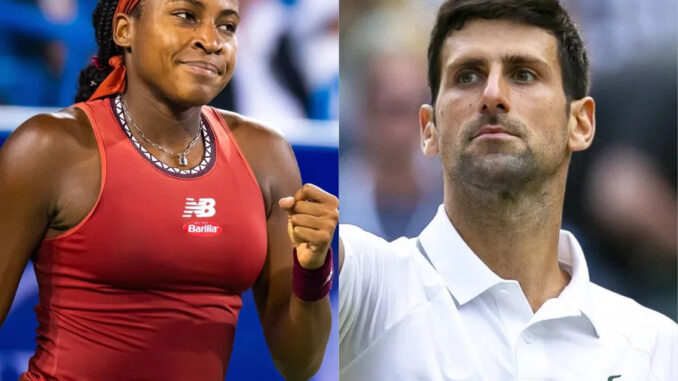
In the glittering world of professional tennis, where Grand Slam champions like Coco Gauff and Novak Djokovic bask in the spotlight of million-dollar paychecks, a growing movement is challenging the sport’s financial structure. The two-time Grand Slam champion Gauff and 24-time major winner Djokovic are at the forefront of a coalition of top players demanding a fairer share of the massive revenues generated by the four Grand Slam tournaments. Their call for change has been amplified by ATP journeyman Taro Daniel, whose candid revelation of a $20,000 financial struggle has laid bare the stark disparities faced by lower-ranked players, sparking a broader conversation about equity in tennis.
Earlier this year, during the US hard-court swing, 20 of the world’s top players, including Gauff, Djokovic, Aryna Sabalenka, and Carlos Alcaraz, signed a letter to the heads of the Australian Open, French Open, Wimbledon, and the US Open. Dated March 21, 2025, the letter demanded higher prize money and a greater say in decisions impacting players, such as tournament scheduling and welfare programs. “We want to be part of the conversation,” Djokovic stated at the Monte-Carlo Masters, emphasizing the need for players to have a voice in revenue-sharing discussions. The players pointed out that Grand Slams generate hundreds of millions in revenue—Roland Garros alone earned an estimated $371 million in 2024—yet allocate only about 15-16% to prize money, a figure dwarfed by the 50% revenue split in professional leagues like the NBA.
Gauff, the 2025 French Open champion, echoed this sentiment, acknowledging her privileged position but advocating for systemic change. “If you want to compare it to other sports, then yes, [the pay] could be better,” she said after her Miami Open first-round win. “For the women’s side, making as many tournaments as we can equal to the men when it comes to prize money is important.” Her $2.9 million French Open winner’s check, reduced to roughly $1.6 million after France’s 45% tax rate, highlighted the financial challenges even top players face. Despite her success, Gauff’s perspective reflects a broader concern for the sport’s ecosystem, where only 97 players—58 men and 39 women—earned over $1 million in prize money in 2024.
Taro Daniel, ranked around No. 150, brought the plight of lower-ranked players into sharp focus. In a recent interview, the 31-year-old Japanese pro revealed the harsh realities of life on the ATP Challenger Tour, where a $20,000 shortfall can threaten a player’s career. “If you’re lower ranked, you’re winging it,” Daniel said, noting that top-20 players like Gauff and Djokovic can afford physiotherapists, nutritionists, and full-time coaches, while others struggle to cover travel and training costs. His proposed solution—a $100,000 stipend for players ranked 300-400, funded by the Slams and tours—would cost each organization about $8 million annually, a fraction of their revenues. “The Grand Slams gross like $350 million to $500 million a year,” he argued. “That’s not unreasonable.”
The push for reform gained momentum through the Professional Tennis Players Association (PTPA), co-founded by Djokovic in 2020. In March 2025, the PTPA filed a lawsuit against the ATP, WTA, ITF, and ITIA, alleging “anticompetitive restraints and abusive practices” that suppress player earnings. “Tennis is broken,” said PTPA director Ahmad Nassar. “Players are trapped in an unfair system that exploits their talent.” The lawsuit, backed by players like Nick Kyrgios and Reilly Opelka, seeks to address fixed prize money, unsustainable schedules, and financial exploitation. While Gauff and Carlos Alcaraz have expressed measured support, focusing on equitable pay rather than fully endorsing the lawsuit, their involvement underscores the urgency of the issue.
The disparity is stark: the 2024 US Open offered $75 million in total compensation, a 15% increase from 2023, yet this represented just 15% of the tournament’s estimated $500 million revenue. Wimbledon’s $64 million and the French Open’s $63.7 million purses, while record-breaking, still fall short of player expectations. “It’s no secret,” said Alexander Zverev, another signatory. “We have the lowest revenue share in professional sport from the Grand Slam side.” Players like Stefanos Tsitsipas emphasize unity, stating, “Players should just unite, and players should be together on this,” to push for a fairer share, even if a 50-50 split is unrealistic.
As Wimbledon approaches, the tennis world watches closely. Gauff, fresh off her French Open title, and Djokovic, with his record $187 million in career prize money, are leveraging their platforms to advocate for change. Daniel’s $20,000 plea resonates as a reminder that tennis’s glamour masks a grueling reality for many. Will the Grand Slams respond to this unified call for reform? The answer could reshape the sport’s future, ensuring that players at all levels share in its prosperity.
Leave a Reply